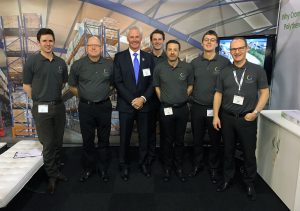News & Insights
Read the latest news from us and our clients across the globe

Posted on 20 June 2018 by Ceris Burns
Thin times ahead
In his previous column for Tomorrow’s Cleaning, Cromwell Polythene managing director James Lee warned that ditching plastic would be a knee jerk and unsustainable response to media stories vilifying its use. That doesn’t mean the plastic industry is complacent about its role in a sustainable society, as James explains.

Firstly, I’d like to thank everyone who came to see us on our exhibition stand at the Cleaning Show in Manchester last month, it was great to see so many people there. It’s fair to say that plastics use was a hot topic of conversation among our visitors. After all the recent media hype that came as no surprise.
Unfortunately, all too often we see the sustainability spotlight focused on a single issue or product, rather than looking at the whole picture. For instance, when trying to reduce C02 emissions from vehicles we were told to buy diesel rather than petrol cars and vans. We have subsequently been told that that the benefits of diesel engines are outweighed by the excessive amounts of nitrogen oxides they produce, and bans are expected. True sustainability is complex and hard to fit in a headline, hashtag or soundbite.
Another side effect of this type of media campaign is that they can focus minds on the wrong thing. For example many industries have far bigger environmental issues that should be prioritised over their plastic use if they really want to make a sustainable difference.
Mounting concerns
That is not to say we’re complacent in the plastic industry. At Cromwell Polythene we’ve always been committed to supplying fit for purpose products with the lowest environmental impact for a net ecological gain. We have been among the leading protagonists of ‘closed loop’ recycling, having used recovered waste packaging in the production of our recycled black refuse sacks for many years.
We have pioneered the need for increased performance from polymers at lower thicknesses to reduce the amount of plastic used. Our LOWCO2T® range – including disposable aprons, laundry bags and now several varieties of refuse sacks – is a case in point. These lightweight products require less material but achieve the same high performance standards. Put simply, less plastic is used to achieve the same (or better) result.
This means that the LOWCO2T range is highly cost effective and offers great value for money. With a growing demand for a reduction in the volumes of plastic in circulation, LOWCO2T offers customers a more resource efficient and environmentally responsible alternative to some of the bigger, bulkier products in the marketplace.
Looking at the bigger picture advantages, the lightweight nature also means fewer carbon emissions during production and transport. The products come packaged in smaller cartons too making transport and storage more efficient.
With an array of products on the market, it’s important that purchasers can tell exactly what they are getting, our range now comes in eye-catching packaging to better promote the products’ environmental and performance credentials.
Taking this approach means we can offer a range of products that make the most efficient use of resources and provide a robust challenge to sacks made from other blends of polythene. For every tonne of plastic that is recycled, there is a 1.5 tonne saving in CO2, whilst thinner products can be transported in larger quantities, requiring fewer trips.
Dealing with demons
We don’t think that plastics deserve the demonization they’ve received in the press, but like all industries we know we need to do more to improve sustainability to protect our planet. As well as more sustainable products we need to see improvements in waste management practices and a change in attitudes in our largely throw-away society.
Plastics are essential for modern life, and, if manufactured and used responsibly, they can benefit the environment and enrich our lives.
http://cromwellpolythene.co.uk/
Published in Tomorrow’s Cleaning – May 2018
Experts in Public Relations Services & Communications Management
Our ServicesGenuine industry specialists in cleaning and hygiene, environmental and recycling, and facilities management
Our Sectors












